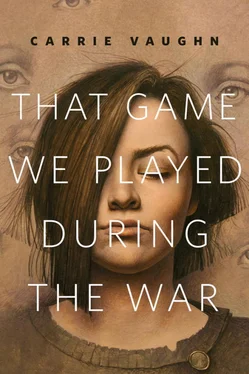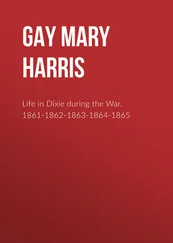Кэрри Вон - That Game We Played During the War
Здесь есть возможность читать онлайн «Кэрри Вон - That Game We Played During the War» весь текст электронной книги совершенно бесплатно (целиком полную версию без сокращений). В некоторых случаях можно слушать аудио, скачать через торрент в формате fb2 и присутствует краткое содержание. Город: New York, Год выпуска: 2016, ISBN: 2016, Издательство: Tor Books, Жанр: Фэнтези, short_story, на английском языке. Описание произведения, (предисловие) а так же отзывы посетителей доступны на портале библиотеки ЛибКат.
- Название:That Game We Played During the War
- Автор:
- Издательство:Tor Books
- Жанр:
- Год:2016
- Город:New York
- ISBN:978-0-765-38935-0
- Рейтинг книги:3 / 5. Голосов: 1
-
Избранное:Добавить в избранное
- Отзывы:
-
Ваша оценка:
- 60
- 1
- 2
- 3
- 4
- 5
That Game We Played During the War: краткое содержание, описание и аннотация
Предлагаем к чтению аннотацию, описание, краткое содержание или предисловие (зависит от того, что написал сам автор книги «That Game We Played During the War»). Если вы не нашли необходимую информацию о книге — напишите в комментариях, мы постараемся отыскать её.
That Game We Played During the War — читать онлайн бесплатно полную книгу (весь текст) целиком
Ниже представлен текст книги, разбитый по страницам. Система сохранения места последней прочитанной страницы, позволяет с удобством читать онлайн бесплатно книгу «That Game We Played During the War», без необходимости каждый раз заново искать на чём Вы остановились. Поставьте закладку, и сможете в любой момент перейти на страницу, на которой закончили чтение.
Интервал:
Закладка:
Next came her turn, and it was no good staring at the board, analyzing the rooks and pawns and playing out future moves in her mind. All such planning would betray her here. So, almost without looking, almost without thought, she reached, put her hand on a piece—any piece, it hardly mattered—and moved it. A bishop this time, and she only moved one square, and yet it was as if a bit of chaos had descended on the board and disrupted everything. No sane chess player would have made that move, and she herself had to pause and consider what she’d done, what new lines of play existed, and how she could possibly go forward from here.
But, and this was the point, the telepathic Valk had not been expecting what she’d just done.
Playing at random was no way to play chess, and she was sure her old teachers were turning in their graves. Unless, she would explain to them, you’re playing with a Gaantish commander. Then the joy in the game became watching him squirm.
“I am glad you are enjoying this,” Valk said.
“I am. Are you?”
“I am,” he said, looking at her. “This gives me hope.”
She had traveled here because she had nothing left. Because she was unhappy. Because her whole life had been spent in this uniform, for all the pain it had brought her, so what did she do now? She hadn’t had an answer until Valk sent that telegram.
And now he was frowning. She’d been able to keep up a good front before this.
“We are all of us wounded,” he said softly.
“It’s your move.”
He chose his piece, a pawn, a completely different move than the one she’d been thinking of, which made her next choices more interesting. This time, she took the correct one, the one she’d do if she’d been playing seriously.
“This isn’t serious?” he asked.
“I’m never serious.” Which he’d know was a lie, but he smiled anyway.
She’d taught him to play when she was his prisoner, but he asked to learn because of what he’d seen when he was her prisoner. She’d had a game running in the prison ward with one of the other nurses. They’d slip in plays between their rounds, in odd down moments, to clear their minds and pass the time. This job wasn’t real nursing, when all they had to do was administer medications, make sure no one had allergies or bad reactions to the drugs, and keep their patients muzzy-headed. Their board had been set up in Valk’s ward that day. Calla had been grinning because her opponent was about to lose, and he was studying the board with furrowed brow and deep concentration, looking for a way out.
A voice had said, “Hey. Hey. You.” He might have been speaking either Enithi or Gaantish. Hard to tell with so few words. Their handsome prisoner was waking up, calling for their attention. Because it wasn’t her turn, Calla had been the one to jump up and get her kit. They’d had trouble getting the dosage right on Valk; he had a high tolerance for the stuff. But they couldn’t have him reading minds, so she made a mark on his chart and injected more into his IV lead.
“No,” he’d protested, watching the syringe with a helpless panic. “No, please, I just want to talk—” He spoke very good Enithi.
“I’m sorry,” she said, and she really was. “We’ve got to keep you under. It’s better, really. I know you understand.”
And he did, or at least he’d see what she understood, that it wasn’t just about keeping information from him. It also kept the Gaantish prisoners safe, when otherwise they’d be outnumbered and battered by hostile thoughts. He still looked very unhappy as he sank back against the bed and his eyelids shut inexorably. As if something fragile had slipped out of his hand.
“Poor things,” Calla said, brushing a bit of lint off the man’s forehead.
“You’re very weird, Cal,” her chess partner said, finally making his move. “They’re Gaantish. You pity them?”
“I just think it must be hard, being so far from home in a place like this.”
She found out later that Valk hadn’t quite been asleep through all that.
Valk made his next move and winced, just as a nurse came over with a hypodermic syringe and vial on a tray, sensing his pain before he even knew it was there.
“No,” Valk said, putting up a hand before the nurse could set the tray down.
“You’re in pain; this will help you rest,” he said.
“But Technician Belan is here.”
“Y-yes sir.” The man went away without administering the sedative.
So much conversation didn’t need to be spoken when the participants could read each other’s minds. They would only say aloud the conclusion they had come to, or the polite niceties that opened and closed conversations. The rest was silent. Back at Ovorton it had often left her reeling, when she was meant to be working with a patient and two nearby doctors came to a decision, only ten percent of which had been spoken out loud, and they stared at her like she was some idiot child when she didn’t understand. She had learned to take delight in saying out loud, forcefully, “You have to tell me what you want me to do.” They’d often be frustrated with her, but it served them right. They could always send her back to the prisoner barracks. But they didn’t; they didn’t have enough nurses as it was. She had accepted an offer to trade the freedom of the rest of her unit for her skills—send the others home in a prisoner swap and she would work as a nurse for the Gaantish infirmary. They trusted her in the position because they would always know if she meant ill. Staying had been harder than she expected.
The nurse lingered near the game. It made Calla just a little bit nervous, like those days at the camp, surrounded by telepaths, and she the only person who hadn’t brought a spear to the war.
“This is a very complicated game,” the nurse observed, and that made Calla smile. That was why Valk told her he wanted to learn—it was very complicated. The thoughts people thought while playing it were methodical, yet rich.
“It is,” Valk said.
“May I watch?” the nurse asked.
Valk looked to Calla to answer, and she said, “Yes, you may.”
Enithi troops told awful stories about what it must be like in Gaantish prisoner camps. There’d be no privacy, no secrets. The guards would know everything about your fears and weaknesses, they could design tortures to your exact specifications, they could bribe you with the one thing that would make you break. No worse fate than being captured by Gaant and put in one of their camps.
In fact, it worked the other way around. The camps were nightmares for the guards, who spent all day surrounded by a thousand minds who were terrified, furious, hurt, lonely, angry, and depressed.
As a matter of etiquette, Gaantish people learned—the way that small children learned not to take off their pants and run around naked just anywhere—to guard their thoughts. To keep them close. To keep them calm, so they didn’t disrupt those around them. If they often seemed expressionless or unemotional, this was actually politeness, as Calla learned.
To the Gaantish, Enithi prisoners were very, very loud. The guards working the camps got hazard pay. They didn’t, in fact, torture their prisoners at all. First, they didn’t need to. Second, they wouldn’t have been able to stand it.
When her unit had been captured, processed, and sent to the camp, she had been astonished because Lieutenant Valk Larn—now Captain Larn—had been one of the officers in charge. Her shock of recognition caused every telepath in the room to stop and look at her. They would have turned back to their work soon enough—that she and Valk had encountered each other before was coincidental but maybe not remarkable. What made them continue staring: Calla revealed affection for Valk. Not outwardly, so much. She stood with the rest of her unit, stripped down to shirts and trousers, wrists hobbled, hungry and sleep-deprived. No, outwardly she’d been amazed, seeing her former patient upright and in uniform, steely and commanding as any recruitment poster. Her expression looked shocked enough that her sergeant at her side had dared to whisper, “Cal, are you okay?”
Читать дальшеИнтервал:
Закладка:
Похожие книги на «That Game We Played During the War»
Представляем Вашему вниманию похожие книги на «That Game We Played During the War» списком для выбора. Мы отобрали схожую по названию и смыслу литературу в надежде предоставить читателям больше вариантов отыскать новые, интересные, ещё непрочитанные произведения.
Обсуждение, отзывы о книге «That Game We Played During the War» и просто собственные мнения читателей. Оставьте ваши комментарии, напишите, что Вы думаете о произведении, его смысле или главных героях. Укажите что конкретно понравилось, а что нет, и почему Вы так считаете.












